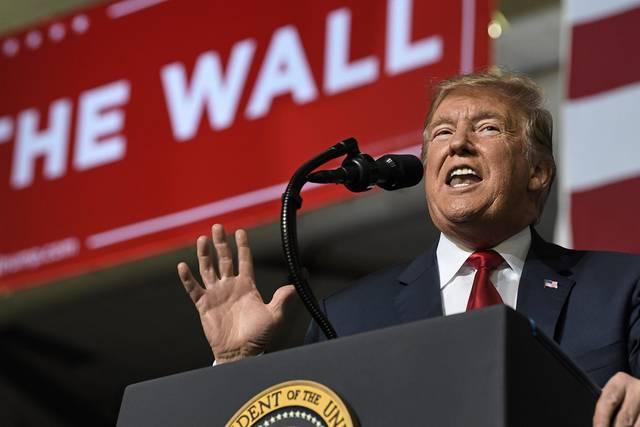Joseph Sabino Mistick: Courts keep Trump in check
Since 1803, February has come and gone with hardly any mention of Marbury v. Madison, which was decided by the Supreme Court 216 years ago. The principle of judicial review was established then, and without that, American history and these last two years would have been very different.
The case arose after Thomas Jefferson had beaten incumbent President John Adams in 1800 in one of the dirtiest political campaigns ever — on both sides. And while the details of the underlying legal dispute hardly matter, the holding of the case continues to shape the nation.
That holding established the power of the courts to strike down laws and executive actions that violate the United States Constitution. And it still keeps us from the ills of monarchies, dictatorships and imperial presidencies.
As Chief Justice John Marshall wrote then, “The government of the United States has been emphatically termed a government of laws, and not of men.”
And while President Donald Trump’s base loves it when he flexes his political muscles, his strongman tendencies would go unchecked without the courts. Sometimes he wins and sometimes he loses, some decisions are final and others only temporary, but the system works.
When a judge stopped Trump from denying asylum consideration for anyone who failed to enter the United States at a port of entry, Trump groused that the decision came from an “Obama judge.” But the Supreme Court refused to change that decision.
And in a rare public rebuke, Chief Justice John Roberts said, “We do not have Obama judges or Trump judges, Bush judges or Clinton judges. What we have is an extraordinary group of dedicated judges doing their level best to do equal right to those appearing before them.”
When the Trump administration attempted to eliminate the Affordable Care Act’s birth control mandate or bar anti-Trump tweeters from using @RealDonaldTrump or deny federal funds to self-declared sanctuary cities or end DACA, the courts have pumped the brakes.
And Trump’s latest declaration of an emergency on our southern border, a ploy to go around Congress in order to pay for his wall — the wall that he promised us Mexico would pay for — will also be resolved by the courts if Congress fails to stop him.
Politicians and government leaders rise and fall, and the will of the majority changes with the wind. Through it all, this government of laws has survived because there is a final arbiter, a branch of government that keeps us mostly on track while we sort things out.
It may seem that the rancor and divisions of our times will never heal. Adams and Jefferson must have thought that, too, as they battled through the thicket of hateful accusations in the years following Marbury v. Madison.
But, by the time they both died, on July 4, 1826, hours apart and 50 years after the adoption of America’s Declaration of Independence, Adams and Jefferson had become friends again.
Much like soldiers of combating armies who have faced each other from opposite foxholes, Adams and Jefferson spent their later years corresponding about the satisfaction that comes from hard-fought battles over the things that really count.
Joseph Sabino Mistick can be reached at misticklaw@gmail.com.
Remove the ads from your TribLIVE reading experience but still support the journalists who create the content with TribLIVE Ad-Free.

